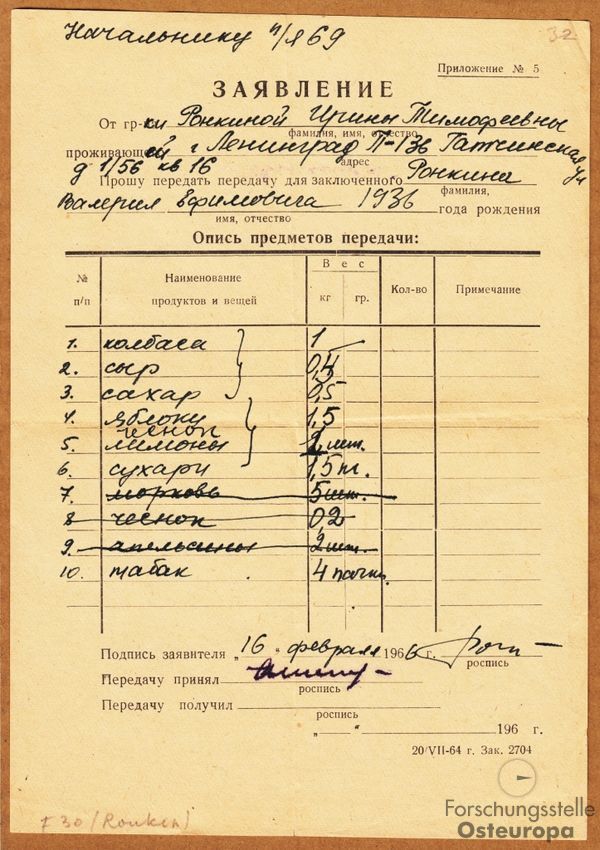Kolloquiumsvortrag
18:15 Uhr, IW3 0330 / Zoom
Alexa von Winning (Tübingen)
Becoming Capitalist in Post-Socialist Russia and Belarus
Bewerbungsschluss: 01.08.2025
38 Std./Monat zum 01.09.2025
Wissenswertes
How a dissidents’ group started and ended on the same day
Commemorating the 55th foundation anniversary of the “Communards’ Union”
List of items sent to Valeriy Ronkin by his mother on February 16th 1966 to the Leningrad Detention Centre. Archive of the Research Centre for East European Studies. Photo: Maria Klassen.
On 12 June 1965 the KGB in Leningrad carried out about 30 searches, prosecuting members of the underground group Kolokol (“the bell”) which was part of the so-called Communards’ Union. At this particular day, the majority of its members were arrested. It is therefore ironically regarded as the day of the Union’s “official recognition” by the state.
In 1962, Valeriy Ronkin and Sergey Khakhaev, two freshly graduated engineers from the Technological Institute Leningrad, produced a brochure which came close to a manifesto: From the dictatorship of bureaucracy to the dictatorship of the proletariat. Later, Ronkin characterized the political views that shaped their writings as “social democratic”. After a year, the brochure was copied and distributed first and foremost among former classmates and their comrades from the students’ Komsomol’ organization. An inner circle evolved and in 1965 it consisted of about 15 people. Most of them graduated from the Technological Institute as well. The circle’s members distributed leaflets that addressed current social and political issues. In 1964 for instance, they prepared a leaflet for students who were about to travel to the “virgin lands” to work on the countryside in Kazakhstan, the Ural and the Volga regions. The communards’ leaflet however warned the future virgin lands pioneers about the “blatant mismanagement” they would encounter there and even called to fight the bureaucratic regime, that was held responsible for such mismanagement.
In spring 1965, the majority of the group concluded that they needed a publication for a broader audience. A publication which would tackle socio-political issues. Their efforts resulted in the creation of the journal Kolokol, thus creating the name for the group. On the title page of the journal “for solidity” the subtitle read: Organ of the Communards’ Union. Two issues of Kolokol were published in April and May 1965, both with not less than 15 copies each. A third issue was prepared but it never saw the light of day because of the group’s arrest.
The scope of investigation was massive. During the “Kolokol case” nearly 200 people were interrogated and it eventually became the first great political process in the post-Khrushchev era. All of the accused were charged with “anti-Soviet propaganda” and almost all were additionally sued for the “creation of and participation in an anti-Soviet organization”. Valeriy Ronkin and Sergey Khakhaev were sentenced to seven years prison camp and to three more years in exile, while seven other members of the group had to serve shorter terms of two to four years in camp detention. The convicts were sent off to the Dubravlag (Oak Grove Camp) in Mordovia.
During all the following years they were supported by their former group members, but also by their former classmates, colleagues and sympathizers. Already during the process in Leningrad, when the young communards were kept in prison, family members were helping where they could. Our archival document of the month shows a list of goods Valeriy Ronkin was supplied by his mother was shortly before his departure to the camp. The list was kept by Ronkin until the late 1990ies, when he eventually decided to give the document among a great number of others to the archive in Bremen.
Already at the end of the 1960ies, when most of the “Kolokol‘chiki” were released from the camp, the tradition was born not only to celebrate the day of their freedom but also the annual anniversary of the group’s official recognition and end on 12 June 1965.
Irina Flige
Further reading
Valeriy Ronkin: Na smenu dekabryam prikhodit yanvari. Vospominaniya byvshego brigadmil’ca, a pozshe – politzaklyutshennogo i dissidenta, Moskva 2003.
Valeriy Ronkin: Sotshineniya: Nablyudeniya, issledovaniya, razmyshleniya, Sankt Peterburg 2012.
Irina Flige is the director of the St. Petersburg branch of “Memorial”, an international organization committed to studying political repressions in the Soviet Union and in Russia today.
Länder-Analysen
Die Länder-Analysen bieten regelmäßig kompetente Einschätzungen aktueller politischer, wirtschaftlicher, sozialer und kultureller Entwicklungen in Mittel- und Osteuropa sowie Zentralasien. Alle Länder-Analysen können kostenlos abonniert werden und sind online archiviert.
» Länder-Analysen
» Eastern Europe - Analytical Digests
» Länder-Analysen
» Eastern Europe - Analytical Digests
Discuss Data
Archiving, sharing and discussing research data on Eastern Europe, South Caucasus and Central AsiaOnline-Dossiers zu
» Hier spricht das Archiv
» Russian street art against war
» Dissens in der UdSSR
» Duma-Debatten
» 20 Jahre Putin
» Protest in Russland
» Annexion der Krim
» sowjetischem Truppenabzug aus der DDR
» Mauerfall 1989

